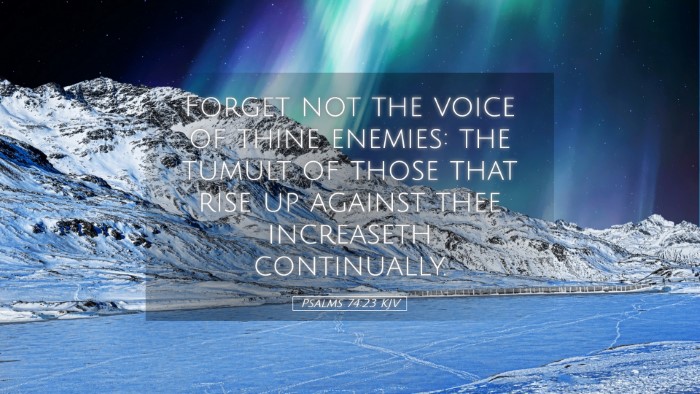Commentary on Psalms 74:23
Psalms 74:23 states: "Forget not the voice of thine enemies: the tumult of those that rise up against thee increaseth continually." This verse is a profound appeal to God amidst distress, reflecting the anguish experienced by the psalmist due to opposition from adversaries. In studying this verse through the lenses of notable public domain commentaries, we gather insights that enhance our understanding of the text and its applications.
Understanding the Context
To appreciate the full depth of Psalms 74:23, it is vital to consider its context within the entire psalm, which addresses the destruction of the temple and the suffering of God’s people. Matthew Henry, in his commentary, emphasizes the historical context of the Babylonian exile, suggesting that this psalm articulates the deep despair and longing for divine intervention during a time of national catastrophe.
The Appeal to God's Memory
The phrase "Forget not" signifies a plea for God’s attention and action. The psalmist, aware of his own limitations, calls upon God to remember the voices of enemies, indicating that silence in the face of oppression may be interpreted as abandonment. Albert Barnes elucidates this point by arguing that the psalmist desires God to consider the increasing tumult of those who rise up against Him. This demonstrates an awareness that the struggles faced by God's people are significant and deserving of divine remembrance.
The Nature of the Enemies
The enemies referenced in this verse symbolize not only the physical adversaries of Israel but also the spiritual opposition against God’s sovereignty. Adam Clarke notes that these enemies represent a collective force, rising continuously to challenge the authority and presence of God among His people. Their tumult embodies a persistent, chaotic disturbance that seeks to undermine faith and trust in God.
Intensifying Conflict
The phrase "the tumult of those that rise up against thee increaseth continually" speaks to the ever-growing nature of opposition faced by believers. This idea is echoed in the writings of Matthew Henry, who points out that spiritual warfare is a reality for God’s people throughout history. The psalmist’s acknowledgment of increasing turmoil serves as a parallel to the ongoing struggles believers encounter, reinforcing the necessity of divine intervention in the face of escalating challenges.
Applications for the Believer
-
Recognition of Suffering:
In acknowledging the sorrows and conflicts faced, believers align themselves with the psalmist's experience, understanding that suffering is a part of the human condition.
-
Active Prayer:
This psalm invites believers to engage in fervent prayer, expressing their concerns and pleading for God's attention to their struggles.
-
Trust in God's Justice:
The verse encourages maintaining trust in God’s sovereignty, even when circumstances seem dire. God’s remembrance of His people’s plight assures them of His ultimate justice.
Theological Implications
Psalms 74:23 raises profound theological questions about the nature of God’s awareness and responsiveness to human suffering. Albert Barnes emphasizes the importance of faith in God’s willingness to act in the midst of turmoil, suggesting that the appeal made in this verse indicates a deep-seated hope in God’s eventual response to injustice.
Conclusion
In conclusion, Psalms 74:23 serves as a poignant reminder of the complexities of faith during times of adversity. Through the insights of noted commentaries, we glean a richer understanding of the text that resonates with the struggles faced by believers today. By recognizing the challenges posed by enemies, engaging in constant prayer, and trusting in God’s justice, the faithful can find solace and strength, assuring their hearts that God remembers the cries of His people.


